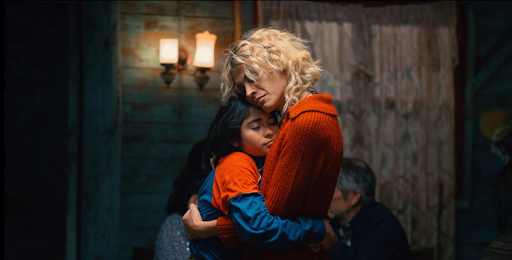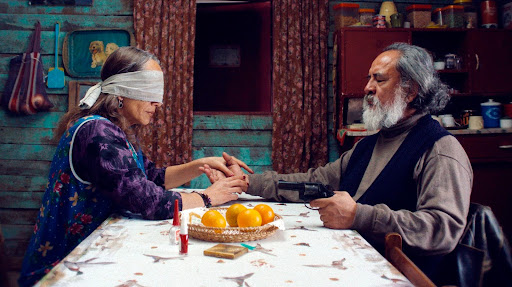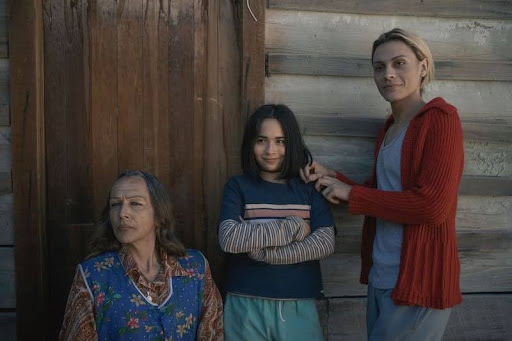‘The Mysterious Gaze of the Flamingo’ Review, Star Matías Catalán Talks Cannes, Character Complexities and a Mysterious Gaze Called Love

As we make our hesitant return to the routines of fall semester, I often find myself reminiscing on the summer. Particularly, the profoundly beautiful experience I had at the Cannes Film Festival in late May.
On my third day at the festival, I had the serendipitous pleasure of meeting Matías Catalán. We were waiting in the same line for different movies, neither of us in the right place. It was typical Cannes confusion, but we laughed it off and started talking. I hadn’t realized that Catalán stars in Diego Cespedes’ “The Mysterious Gaze of the Flamingo” (as Flamingo!) until it came up in conversation. The film was already high on my list, but our chance meeting only furthered my conviction to make it happen.
The next day, I waited over an hour in the last-minute line to secure my seat at the film’s final screening. In the film, Catalán appears vastly different.
“This has been the most demanding work I have undertaken thus far,” Catalán shared in an interview with me. “Physically, I had to lose 15 kilograms, grow out my hair, strip it of its color and remove my eyebrows. Psychologically, it involved nearly ten months of intensive study, focusing on the historical context, the character and the era.”
This film marks Catalán’s most significant acting project since his film debut in “Bitter Gold” in 2024.
I remember having left the theater after watching the film feeling like I was in a trance. Mesmerized by the makeup, the vivid colors and the lavish clothing that starkly contrasts against the nude-green color palette of the Chilean desert, the film had me completely absorbed in its bold world. Beyond visuals, the thematic exploration of love, identity, found family and grief struck me deeply. The subjects are heavy and the story is heartbreaking, but in spite of the challenges they face, the way the characters exude love and embrace life in the face of death will truly leave you with a beautiful feeling in your heart.
“I am not certain that I chose this film, rather, I believe it chose me,” said Matías. “It was impossible to decline–both due to its subject matter and the challenge of bringing such a complex character to life.”
Since they first premiered at the festival in May, many Cannes premieres have found their way to the international stage: “Eddington,” “The Phoenecian Scheme,” “Splitsville,” “The History of Sound” and “Highest 2 Lowest,” among others. Despite the presence of these large-budget films in the festival, the independent international films did not go overlooked.
Just last month it was announced that Cespédes’ film, one of my favorites from the festival, would also continue its rise to international acclaim. The film has been selected to represent Chile in the “International Film” category at the 98th Academy Awards. It is also being sent to the Goya Awards, Spain’s principal national film awards (the Spanish equivalent of the Academy Awards). The Chilean transgender drama received nominations for the “Queer Palm,” “Golden Camera” and “Un Certain Regard” categories at Cannes, ultimately winning the coveted “Un Certain Regard” competition. In September, the film had its North-American premiere at the Toronto International Film Festival (TIFF).
“The Mysterious Gaze of the Flamingo” recounts the story of Lidia, the sole girl in her community, who sets out in search of the truth as an unknown disease begins to spread in her small town in the Chilean desert. With the imminent threat of death from this disease, tensions arise as the town’s mining community accuses gay men of transmitting it through their eyes. The film allegorically tackles the plight of AIDS in Latin America through the struggle of their transgender community to live freely as themselves and be approached with respect and humanity.
In the film, rumors circulate that the fatal disease spreads by looking in the eyes of a gay person. Upon locking eyes, it is said, you will fall in love with them, and from this intense gaze you will be afflicted with the disease. This implication reflects the dangerous political rhetoric that has historically subjected the trans community to acts of violence and limited speech, power and respect. Catalán, whose character falls victim to this tragic narrative, expresses that “prejudices stem from [people’s] own inner demons and repressions.”
In the film, the miners of the community resort to covering the eyes of the gay men, in an attempt to stop the transfer of their so-called “infectious love.” The mysterious gaze and the metaphor of the eyes are foundational to one of the film’s core messages: a demand for humanity.

Credit: Noticine
The conversation between hate and love is not accidental nor minimal. Cespedes’ decision to metaphorize love with the gaze exposes the fears of many who are queerphobic: the idea that someone else’s existence in truth may alter their own understanding of love, forcing them to confront and therefore recontextualize or expand upon their own experience of love. Most cannot accept this, and these internal fears can build up and express themselves through violence.
Universally, eyes are known to channel empathy. Our eyes reveal truth, and there is no hiding it. How many times have we heard the expression “the eyes are the windows into the soul”? How many times do you (Yes, you!) look down and hide your gaze when you are hurting, angry or trying to hide something? How many liberation and justice movements demand that we “open our eyes” to the world and to the suffering of other human beings? Cespedes’ choice for the eyes to spread both love and disease is incredibly meaningful. It highlights the power of truly looking at someone and seeing them, and points to the vulnerability of a shared gaze–and as we know well, when vulnerability is present, so is fear.
The bandaging of eyes reflects the townspeople’s refusal to empathize with their trans and queer neighbors–a struggle that can be applied to a broader sociopolitical climate. Through this metaphor, Cespedes demands for us as an audience, and for those who feed into hate against the trans and queer communities, to stop closing their eyes. Instead, he encourages them to look in the eyes of their own queer neighbors and see that there is love and there is beauty, but above all there is a human being like any other–with hopes, dreams, fears, anger and joy. Even more than respect and humanity, Cespedes demands us to approach each other with love; this is the ultimate goal.
Beyond the present struggles, “The Mysterious Gaze of the Flamingo” highlights the importance of found family. When Flamingo dies, Mama Boa and her whole community take Lidia, Flamenco’s daughter, under their wing, helping her navigate the complicated dualities of life–the joy, the pain and the cycles. “Despite the immense challenges they face daily, [the women and men in the community] persist–and they do not persist alone,” said Catalán. “To the younger generation, I would encourage them to seek out and connect with their elders. You are not alone; the entire trans resistance stands with you.”

Historically, communities like the one Mama Boa founded are instrumental to the survival and the fulfillment of trans youth and elders alike. These are not mere gathering places, but homes and families. The members of these communities provide each other with the love and support they unfortunately do not receive from their biological families and provide a space for an unapologetic exploration and self-affirmation as a human being.
Cespédes frames the film through the perspective of Lidia, Flamingo’s eleven-year-old daughter, a decision that allows the film to explore the importance of found family in the development of identity, especially amidst rapidly changing circumstances. As a college student trying to find myself while navigating life among new people in a rapidly changing political climate, Lidia’s experience resonated deeply with me. Her story serves as a reminder that the bravest approach to life is through a full embrace of curiosity and love.
“Life is too fleeting to be lived without love,” Catalán said. “I am not referring solely to romantic love, but also love for oneself, for those who cherish us, for our friends and for our families.”
